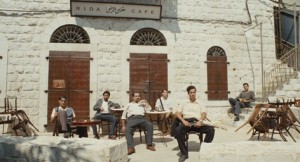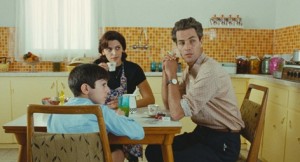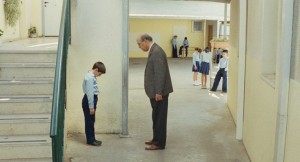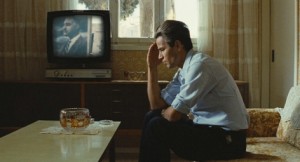Elia Suleiman’s ‘The Time That Remains: Chronicle of a Present Absentee,’ opening at the Tel Aviv Cinematheque February 6th, is one of the most challenging films to arrive in recent years. After seeing it at the most recent Haifa film festival, I was overwhelmed by just how much was packed into this film that I needed to see it again just to get a good grip on it. That second viewing did not reveal any easy narrative to this film, a single strand that is the key to it all. Thus, all I can provide is a series of impressions from this film, which is overwhelming for all the variety of narrative, tonal, formal and emotional ground it covers, and thrilling for the same reason.
A brief prologue shows Suleiman (credited as ES) in present day arriving at Ben-Gurion airport, presumably from his Paris home. He is picked up by a cab-driver (played by Menashe Noy, who had a troubling cameo in Suleiman’s ‘Divine Intervention’) who loses his way in a sudden storm. Unsuccessfully trying to reach the dispatch, Noy despairs, saying “Where are all the Kibbutzim? What is this place? Where am I?” It’s not the most subtle scene, but it effectively and bluntly sets the stage for the sprawling personal history Suleiman unfurls in the substantial first section of the film. The year is 1948. The I.D.F. is covering the city of Nazareth in propaganda through pamphlets and loud-speakers to pave the way for the aftermath of the city’s surrender. The mayor of the city is stoic, obviously devastated, as the I.D.F. commanders stand with him and the city’s elders for a painful photo-op that immediately follows the city’s surrender.
The I.D.F. quickly moves into gear. After the city’s defenders run into the nearby trees, abandoning their makeshift uniforms and weapons, a squad of Israeli troops dons said gear and marches into the city, side by side with uniformed I.D.F. troops. It’s a charade, intent on showing the former defenders submission to the I.D.F. It is an interesting episode…until the troops stop their march near a screaming local woman, and one of them pulls out a pistol and shoots her in the head. It is not the only example of I.D.F. brutality in the film, but it is by far the most shocking, disturbing and outrageous one. Alone, the murder of an unarmed woman is horrendous enough, but the way Suleiman portrays it, it is given tremendous political subtext. The I.D.F. dons costume and theatrically marches, all intricately choreographed. One of its members shoots a woman in cold blood- also choreographed. It is rhythmically part of the same series of movement. Suleiman has taken his usual intricate choreography and applied to the I.D.F. –where, in this film, murder is part of the dance.
This is further expanded upon in a later scene, where soldiers are seen emptying the contents of a hastily evacuated Nazareth house into a jeep. They take a record player and start playing Arabic music. As this sight unfolds, their movement becomes more and more choreographed to the music, culminating in a dance around the folding of a table-cloth. It is a quietly thrilling piece of filmmaking (all in one shot), but it is set to Arabic music. It implies the pillaging of Arabic culture. A lot more happens in this first section of the film, but these two scenes trouble me to no end. Suleiman is not making simple anti-Israeli propaganda with this film- there is no sense of ethno-centric hate, or anything as simple as that. That would be easy to ignore or to get indignant about. This is deep sadness, deep anger and resignation. As much as I might argue against these episodes being indicative of the whole –and I firmly believe that my army is not typified by choreographed brutality- Suleiman is not using agit-prop in these scenes. They have the weight of emotional truth that I found myself helpless to deny. And that helplessness is as strong and troubling as anything I’ve felt in a movie in the past year.
Connecting those episodes is the impetus for the film- the story of Suleiman’s family. Saleh Bakri (‘The Band’s Visit) plays Fuad Suleiman, Elia’s father. In 1948, he is an incensed young man, attempting to produce weapons and rally friends to fight the Israelis. After a friend informs on him, he is arrested, beaten up, threatened with death, and finally thrown over a cliff. Audaciously, the film then jumps forward in time. The year is 1970; Fuad is somewhat surprisingly alive and well. He has high blood pressure, but no physical repercussions of past events are evident. He has a comfortable life with his wife and only son. Following his tumultuous earlier years, he has become the strong, silent type. He has become an observer (Observing is the explanation for the film’s subtitle). He takes joy in late-night fishing with a friend, which invariably includes macho-posturing by an I.D.F. patrol- which he endures, bemused, pride untouched. He is warm, but never demonstrably emotional; he is resigned to the reality of his life. In a running gag, an elder neighbor regularly gets drunk, douses himself in gasoline and tries to light himself on fire, because of the shittiness of it all. Fuad always calmly walks up, puts out his cigarette, takes away the man’s matches and walks him home. Fuad has left the understandable but useless reactionary rage of his youth behind.
It’s a world-view that appears to be Elia Suleiman’s as well, as a filmmaker and as a character (his main character is always a present-absentee). As he has in previous works, he appears here silently, stoically observing, rarely interacting. That is only later in the film, however. As a child, he is portrayed by Zuhair Abu Hanna as a precocious and engaged young kid. Nazareth in 1970 is a far less turbulent place than it was in 1948, and Elia’s rebelliousness is expressed in school, where he is yelled at by the principal for calling the U.S. colonialist and imperialist. We see a bit of the impact of popular culture here, when a teacher shows the students ‘Spartacus’. It is a curiously powerful ode to pop-culture’s universality, that this big budget Hollywood socialist parable, directed by and starring Jewish men, resonates with Christian-Arab school children in Nazareth (That scene also includes one of the film’s funniest moment, regarding a kiss shared by Kirk Douglas and Jean Simmons, who just passed away this week).
The political aspect is always present in the film, of course, and is given its most surprising workout in Elia’s school days. We see a Government official visiting the school. It is filled with Israeli flags and all the children are dressed in blue. We hear a children’s choir singing the classic Naomi Shemer song ‘Machar’ (‘מחר’, Tomorrow). It is sung by the school’s girls choir. The cognitive dissonance in this image is shocking- young Arab girls, singing a traditional patriotic Israeli song in Hebrew with Arabic accents, accompanied by a darbukka. One could infer from this any number of things about the relationship of Israeli-Arabs to the state…I am not quite sure what Suleiman wants us to take from it. But it is an amazing image.
The film eventually moves on to 1980, where a conflicted teen-aged Elia is trying to figure out his place (He sees young men and woman throwing stones at soldiers, and doesn’t seem to know whether he should be with them or not). His father is dying, and someone has informed on Elia to the police. He has 24 hours in which he can leave the country. In those 24 hours, his father passes away. The teenaged Elia leaves…and we next see Suleiman himself, arriving at his family’s home in Nazareth (right after the cab-ride that opened the film). It is present day. The rest of the film is a series of episodes, loosely framed by Elia’s caring for his ailing mother. This portion of the film isn’t tight like the earlier parts- it feels messier, less precise. Every scene contributes something towards the overall film, but they feel in some ways like a return to ‘Divine Intervention’, his previous film. That is a terrific film, but the new one lost some focus in present day, particularly without the tremendous charisma Bakri brought. There is a brief fantasy scene of Suleiman leaping over the wall of separation that didn’t feel as authentic or immediate as the fantasy sequence at the end of ‘Divine Intervention’…but there are still great scenes to be found. One, an echo of the ‘Spartacus’ scene, has the Filipino woman that cares for Elia’s mother sing karaoke to ‘My Heart will go on’ from ‘Titanic. Yes, it’s funny and ironic- but it is also a sincere acknowledgement of the impact pop-culture has (even if it is presented by Celine Dion). One of the film’s most touching scenes echoes Hou Hsiao-hsien’s film ‘The Flight of The Red Balloon’- Elia’s mother sits at her porch at night, holding a photograph. In the background, a beautiful array of fireworks goes off. Her Filipino helper tried to call her attention to it, but the fireworks (like the red balloon) are a signifier of wonder, where the old woman cares only for the photograph, which is of her deceased husband. She is unable to see past the sadness.
A healthier response is presented in the film’s most blunt image. It is a brief scene of a young guy talking on his cell-phone, walking up and down the street in front of his house. Right next to him is a tank. This tank follows the guy’s every move, aiming its canon at him. The guy never registers the tank, and goes on, his life undisturbed. It’s the film’s least subtle scene, but also the most politically concise. When faced with oppression, this young man ignores it completely and goes on living his life. This seems to be crucial to Suleiman’s view, an extension of his father’s. The final scene is the film shows Suleiman sitting outside a hospital, people coming and going rhythmically to a techno version of ‘Stayin’ Alive’. An optimistic take would be to read the scene as saying that staying alive is your best bet- very little beyond that is up to you (Similar to ‘A Serious Man’, about the possibilities of dealing with hardship beyond your control). This film, however, is subtitled ‘A Chronicle of a Present Absentee’. Perhaps being absent -as Suleiman is, living in Paris- is the only way to stay alive. I was left helpless, again. The problem in this film is Israel, the occupier. But before one can even formulate a response, he’s moved on to what one must do in such a situation. The things he presents as facts are at times confronting and risible and anathema to my own world-view…but his reaction to those facts is fascinating and vital, as politics and as cinema.
One last note about the film: In addition to everything else, it is also a very, very funny film. Often Suleiman is delivering a gut-punch while you laugh, but there are numerous endearing jokes that are incidental to the story. It is one of his hallmarks- the humor and the pathos generally go hand in hand, but humor is its own reward. It’s what makes Suleiman not only a formally thrilling and politically essential filmmaker- but a generous one as well. He wants the audience to enjoy themselves. Sometimes he wants you to laugh at the composition of a scene while recoiling from its implication, sure. But his films are rich in practically every way a film can be rich. They are political yet personal, resigned yet enraged, heartbreaking yet hilarious- all presented with the richest cinematic form, which, even with its parts of Jacques Tati, Buster Keaton and Godard, are as a whole completely unique.











Comments are closed.